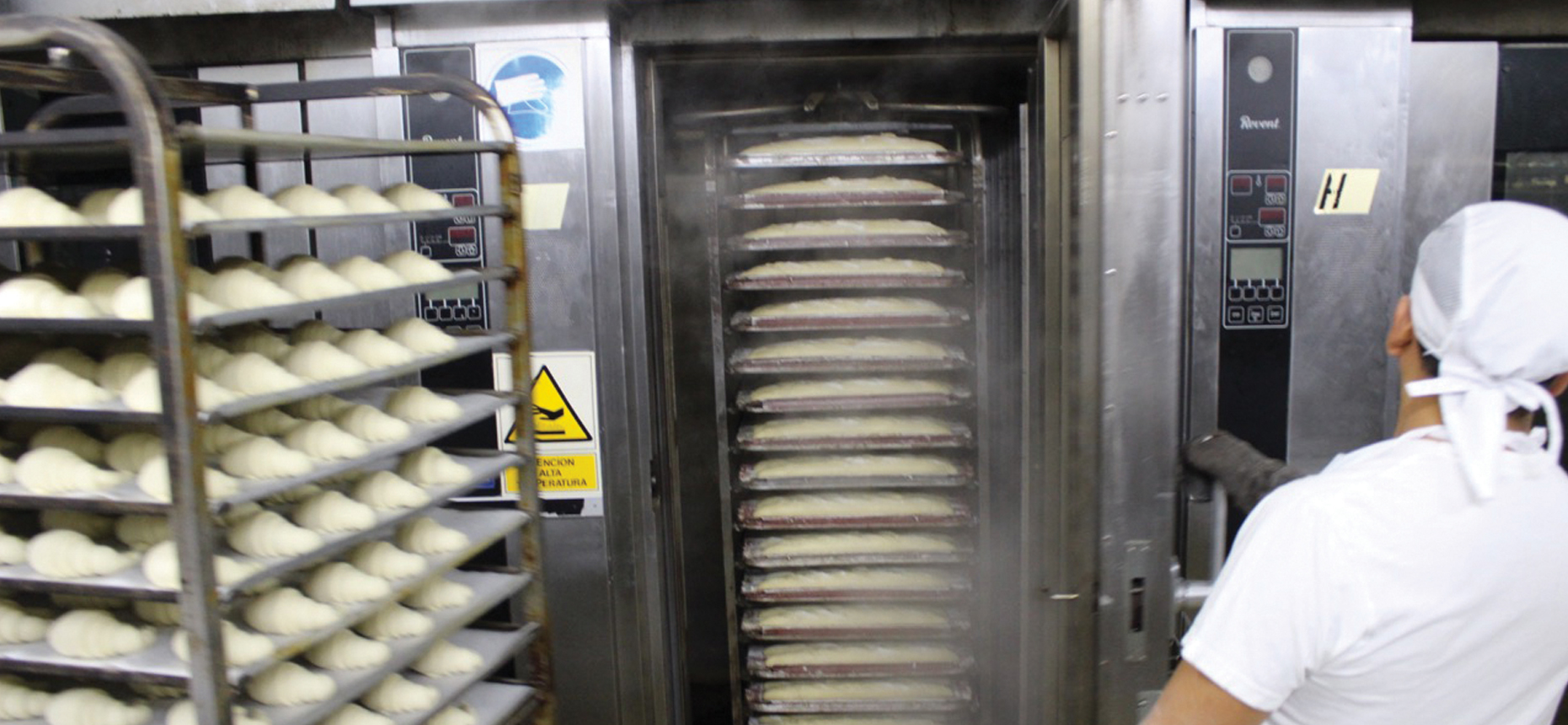On a quiet street corner in Barcelona’s Sants neighborhood, not far from the Camp Nou football stadium, a passerby slows down to peruse a cafeteria’s display window. It’s filled with inviting bocadillos and croissants that make it hard to keep walking.
Even from across the street, 365.café’s baguettes are the most visible feature of the shop, thanks to a smart layout and a lighting system that makes them shimmer like gold. It seems that, as it should be, it is all about the bread here.
The shop in Sants is one of 55 (some of which are franchises) that 365.café operates across the Catalan capital.
Standing by the shop’s counter on a warm evening in July, Agustín Tena, whose father Juan Antonio Tena and his wife Emi Castro started 365 as a bakery in 1999, tells me: “This is one of the shops with the new layout. In the old one, the bread was in the back, and people had to ask us what types were available. Now, they can see the product for themselves. We have brought changes to the way we display the bread, taking it out for everybody to see, and have also made an effort to change the overall image of 365.”
The changes seem to be working: some of the re-designed shops have already seen a 10% to 15% increase in sales.
However, as interesting as the layout of the shops is—not to mention the application of lean in them (I’ll get back to it later)—it’s the inner workings of the factory supplying them that represent a unique example of lean thinking application.
Lean Thinking Guides Growth
In 1999, 365 was just one bakery, operating out of a small facility in central Barcelona.
Emi, head of shops, says: “At that time, we were in the process of purchasing the entire building. We felt we needed more space if we were to supply a growing number of shops. We were going to finalize the purchase once back from our holidays. However, during the time away, my husband Juan Antonio read Lean Thinking and decided that buying the entire building would not be necessary.”
Running smaller batches and changing the way work was organized allowed them to stay in the same facility until shop number 32 opened (in the meantime, in 2004, the franchising model was introduced).
Instead, they reviewed and improved their processes. Running smaller batches and changing the way work was organized allowed them to stay in the same facility until shop number 32 opened (in the meantime, in 2004, the franchising model was introduced).
But don’t think today’s factory is a huge space either. In fact, you would find it hard to believe that such a tiny facility can supply dozens of shops (I know I did!), producing what all of them need each day. The only way to make this possible is to have a perfectly oiled mechanism in place, and 365 does.
Walking in the factory, I got the impression I was in a place that is not very lean. Oriol Cuatrecasas, director of the Instituto Lean Management, who was with me during the visit, had warned me, urging me to wait before jumping to conclusions. In the semi-dark room we entered first, piles of flower bags and a few boxes ready for delivery seemed to occupy every available square inch. In the tiny workshop where the food is prepared, three production lines (one for baguettes, one for pastries, and one for cakes) were surrounded by several trolleys carrying piping hot pains au chocolate and croissants. Past the ovens, a room is used to cool down the bread and arrange deliveries to the different shops. Until you are told how the system works, you might be tempted to think the place is really quite messy.

See the agenda and register for Lean Global Connection at https://planet-lean.com/lean-global-connection/
Agustín, who works as head of continuous improvement, says: “When a problem occurs, we know we only have two hours to fix it. After that, we are not able to supply all the shops.”
“The bigger the factory, the more the waste. Keeping a small operation with no stock is a sort of poka-yoke preventing us from generating waste. I will not move to a bigger factory until I have to.”
—Agustín Tena, Head of Continuous Improvement
It feels like this constant pressure is what keeps the system going. Juan Antonio, 365’s CEO, confirms: “The bigger the factory, the more the waste. Keeping a small operation with no stock is a sort of poka-yoke preventing us from generating waste. I will not move to a bigger factory until I have to.”
Space comes in short supply here, and different parts of the facility serve other purposes depending on the time of the day. It’s in this sense that the entire system must run like clockwork: if a supplier shows up either too early or too late, there won’t be any space or resources available for him to unload his truck. This is perhaps the most peculiar trait of the organization, and the thing that makes their lean implementation so unique.
“When someone from outside comes to see us, they always ask me how we can live with so much stress, never knowing if things are going to be okay or not. It’s a fair concern, and problems do occur, but we have found a way to manage the system now. And it works,” says Juan Antonio.
For example, a few weeks ago, a supplier called at 4 p.m. to tell 365 that a problem had occurred and that they would not be able to supply the raw material in time. Juan Antonio called them to ask if they could at least provide what was strictly necessary for them to make it until 8 a.m. the following morning. “Sure enough, somebody was sent out to give us what we needed. It’s by developing very close and good relationships with our suppliers that we can manage our unique way of working. We don’t talk about weeks or months here … because we produce for the next day, we talk about hours, and this is the only way we can deal with this constant urgency,” he concludes.
Putting People First
As we know, every lean implementation has (or should have) people at its core. 365 has a very people-centric approach to the application of lean, even though—as Juan Antonio says—at first the methodology was something of an imposition.
“We called in external help to support the implementation, and then we insisted, insisted, insisted. Eventually, people got on board. But it wouldn’t have happened without our full commitment. We had to convince ourselves before we could convince others,” he says.
Over time, people became less afraid of change and more aware of the benefits lean could bring to their way of working. However, as Unai Abrisqueta, head of production, explains, fear is never really gone for good. “It’s fundamental to show that the changes you implement actually improve the situation. If people are less tired at the end of the day and see us helping them, then they’ll be with us,” he tells me.
It’s fundamental to show that the changes you implement actually improve the situation. If people are less tired at the end of the day and see us helping them, then they’ll be with us.
Unai Abrisqueta, Head of Production
The beauty of lean thinking is that it has a “common sense” element to which anybody can relate. As Juan Antonio explains, you don’t need to be a Japanese engineer to understand lean: the standard work is clear enough for everybody.
Juan Antonio goes on: “I tried to transmit lean principles the way I understood them, but the real acceleration happened after we got people’s support. My role is to be 100% convinced that I want lean, especially in a tiny organization like this.”
To Emi, the fact that 365 is a small company is an advantage because communication happens more directly, face-to-face, and quickly. “People are free to ask questions and to ask you to explain the system to them again if necessary,” she says.
Agustín adds: “What has helped us introduce this new way of thinking was proximity and trust. Change happens really quickly when people believe in what you tell them.”
But for this to happen, operators need to be able to communicate with the bosses, and the team members put a lot of focus on this aspect. Unai confirms: “I come from a multinational, and I can tell you that large corporations would pay good money to have even half of the involvement of management in the day-to-day activities that we have here.”
People development is organized around a monthly training calendar, which is directed at shop employees. It is Emi who carries out the training, running many of the courses (product, cafeteria, customer care, English, lean basics), which are repeated every month and are open to anyone interested), encouraging people to get better when they struggle and listening to customer feedback. For newly hired people, the first day is of mere observation, with tasks and standards being explained on the second day.
“For a while, we stopped the courses, and the ‘veterans’ soon asked me to resume them. ‘They are necessary, and we miss them,’ they told me. That’s when we created the calendar, always making sure the training takes place in the shops, not in a classroom,” Emi says.
Understanding the customer is, of course, a big part of the skills taught to the shop staff. She continues: “Being a customer in your own shop is so important! You can tell right away if a customer is waiting too long. Do they look stressed or relaxed? Are they waiting too long? Have they found what they were looking for? We are always in close contact with our customers.”
In the event of a complaint, the staff is taught to speak with the client, listen to them, explain what happened, and apologize. All complaints are flagged up, and problems are solved using A3 thinking.
Changing the Process with Lean
Before introducing lean thinking, the company used to bake bread and pastries for the entire week, freezing them, which, of course, required a lot of space. In 2006, they stopped using freezers and began to produce one day for the next. They supply the shops at night.
To know how much of which product they must produce daily for each shop, they conduct a careful demand analysis. The same is true for replenishment activities.
Several systems work simultaneously to help management figure out daily demand. For example, with certain products, such as cans of soda, they use an IT system. Every time a can is sold, a request is sent to the warehouse to provide one extra can to that shop the following day.
There’s then a very effective kanban system used to replenish the shelves in the back room of the shops (a similar one has been introduced in the kitchen at the factory, from where 365 also offers catering and prepares meals). Then, finally, some products are stocked based on a forecast and historical sales.
The company’s system sees a mix of made-to-stock (for products like soda cans, for example), based on pull, and made-to-order using heijunka to get the same production pattern every day with minor adjustments.
Agustín confirms: “Because we produce one day for the next, there is no planning past, well, tomorrow. We supply our shops exactly with what they are going to need – we only keep a half-day stock for the products that we normally need a lot of.”
At the end of each day, what’s not been sold is thrown away. This policy helps 365 better understand the quantities to produce and adjust output levels based on actual consumption (a limit of 10% waste is in place).
Becoming a Lean Enterprise
The Tena family is adamant that the company still has a very long way to go before the entire organization works around lean principles. At the same time, there seems to be more to do in the shops than in the factory. Emi explains: “It’s not that it is difficult to apply lean in the shops. It’s just slow! There are a lot of people involved, and we can’t really proceed until everybody is at the same level. Additionally, we are all scattered around Barcelona.”
Lean thinking allowed 365.café to open 32 shops without having to move to a larger facility. At the same time, it has helped the company make the most of its current 650-square-meter factory to successfully and efficiently supply 55 shops and—Juan Antonio is sure about this—can support a much higher number.
What we are doing out of this factory is pretty much unheard of. People have a hard time believing that we are actually producing enough for 55 shops, but we are.
Juan Antonio Tena, CEO
“What we are doing out of this factory is pretty much unheard of. People have a hard time believing that we are actually producing enough for 55 shops, but we are. Our system is planned to work seamlessly with a certain number of shops, so the day we reach capacity and lean improvements cannot help us do more with the same any longer, we will look for another solution,” Juan Antonio says.
His plan for the next three years is to open five to six new shops annually, depending on demand. Adopting lean has given 365 many advantages, on which it is possible to build further: because responsibilities and tasks are extremely clear and the system is optimized, shops can be run with just a couple of employees; keeping products cheap has helped the company to stay competitive even in the face of extraordinary growth and Spain’s economic woos; and producing every day for the next has allowed them to use the space in the shops to accommodate customers as opposed to storing hundreds of frozen baguettes.
Creating Leaner Shops
Change is a big part of the family’s plan for the future of 365, and because lean has provided them with a trustworthy system, experiments can be carried out and plans made without fear in the factory as much as in the shops. “In the experiments we run, we almost feel like we are jumping from a plane with the certainty that our parachutes are in working order and will not break. We know that our processes and our system work,” explains Juan Antonio.
Lean was introduced in the shops in 2011, “only when we saw that the factory was working well,” Emi stresses. The separation of tasks (person A works at the till, while person B makes the coffee) leaves no room for confusion. At the same time, a very effective kanban system at the back sends input to the factory to ensure replenishment takes place.
The improvements in the shops were tangible early on:
- Employees kept the shops tidier.
- There was no overlapping of roles among staff members.
- The customer’s experience improved.
“All the yelling, all the waiting, all the ‘where’s my coffee?’ that we had before, it all disappeared. Today clients are being served more quickly, and everything is under control, which makes for a nicer experience for everybody,” Emi continues.
All the yelling, all the waiting, all the ‘where’s my coffee?’ that we had before, it all disappeared. Today clients are being served more quickly, and everything is under control …
Emi Castro, Head of Shops
In the Sants shop, Agustín and his family are trying something new: preparing some of the bread on-site instead of the factory. Loaves and baguettes are provided ready to cook. “We normally add value in the factory, but by letting people cook the bread in the shops, we are pushing the value-adding activities closer to the customer. Selling a product that you have made yourself is a very different thing. It is much more personal and gives you confidence,” he says. If successful, this experiment might prove there is an opportunity for 365.café, as transporting a ready-to-make product becomes possible.
As the sun sets behind the tall apartment buildings that tower over the shop, the bread seems to become even shinier in the warm, yellow light of the display behind the counter. It’s almost closing time. Tables and chairs are being cleaned, the floor is being wiped, and a few last-minute customers on their way home rush in from the street to grab a sandwich.
Agustín and I are talking about the future of 365, and it is clear that he cannot imagine one that does not involve lean. “We are a business, and we want to be successful, of course, but at the same time, we want to be close to our customers. We rarely accept things the way they are, and we constantly look for ways to improve. But we know that in order to have that flexibility, we need to keep our stock low, be as lean as we can, and bring value to our customers,” he says while pointing at a man buying a baguette. “After all, it’s all about the bread.”
This article was originally published on Planet Lean, with the headline “The amazing growth of a chain of lean bakeries in Spain,” on July 16, 2015, and posted with permission.
Virtual Lean Learning Experience (VLX)
A continuing education service offering the latest in lean leadership and management.





